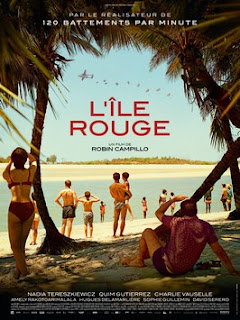RED ISLAND ***
IDEA: A young French-Algerian boy grows up on a military base in Madagascar during the waning days of French occupation.
BLURB: A Bildungsroman hinges on a matter of perspective; particularly, the widening purview of a young protagonist who slowly comes to understand the complexities of the adult world into which they’re entering. With an emphasis on loss of innocence, these kinds of coming-of-age stories often take place within the context of war, injustice, or domestic unrest, all things present within the postcolonial setting of Red Island. On the titular island, eight-year-old Thomas bears witness to the erosion of national and familial stability. Like Terence Davies’s surrogate child protagonist in his semi-autobiographical The Long Day Closes, Robin Campillo’s proxy in his own auto-fiction is a queer-coded boy who peers endlessly at the straight world from a distance, glimpsing heterosexual, masculinist rituals from behind dimpled glass and through the slats of a crate. He’s also a young French-Algerian living in Madagascar, making his status one of multiple liminality. Thomas’s sphere of influence is a jumbled one, inhabited by a military father on one hand and a crime-fighting girl from a superhero comic on the other. Campillo excels in locating the disquieting juxtapositions that emerge for Thomas in this strange land, whether through a series of match cuts that link an aragonite table with aerial military views of Madagascar, a Christmas party taking place in a hangar, or a screening of Abel Gance’s Napoleon on a tropical beach at night. Similar to Claire Denis’ White Material, Campillo’s Red Island considers French colonialism in Africa from a place of lived autobiographical ambivalence, mostly through the experiences of the colonizers. But in its final act, a bold structural turn expunges the white characters and cedes the ground to the Malagasy people. It’s a necessary and elating narrative tradeoff in a film that welcomes the inevitability - and importance - of attaining a wider perspective.

No comments:
Post a Comment